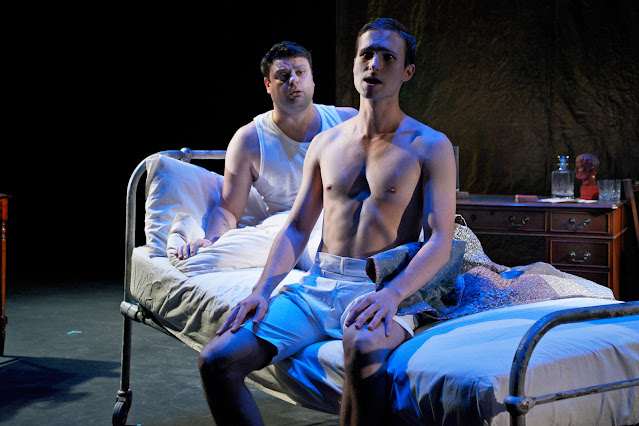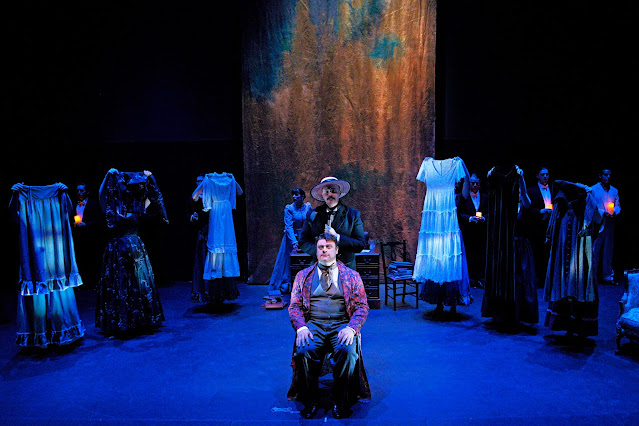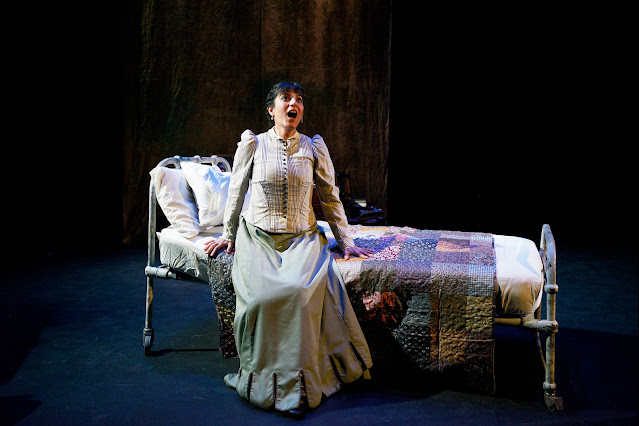 |
| Caruso & Toibin: The Master - Thomas Birch, James Wafer - Wexford Festival Opera (Photo Padraig Grant) |
Alberto Caruso and Colm Toibin: The Master; Thomas Birch, James Wafer, Annabella-Vesela Ellis, director Conor Hanratty, music director Alberto Caruso; Wexford Festival Opera, plus Ami Hewitt & Gioele Muglialdo in recital
Reviewed 1 November 2022
Novelist and local boy Colm Toibin turns librettist for an intriguing new opera based on his book about Henry James
In addition to the main stage operas, Wexford Festival Opera's season includes smaller-scale Pocket Operas performing during the day in the Studio Theatre at the National Opera House, with piano accompaniment. This year's programme featured Alberto Caruso's The Master, with a libretto by local-boy, Enniscorthy-born novelist Colm Toibin. We caught the performance on 1 November 2022, the production was directed by Conor Hanratty with designs by Lisa Krugel and Alberto Caruso directed from the piano.
A large cast was headed by Thomas Birch as Henry James, James Wafer as Hammond/Oliver Wendell Holmes and Annabella-Vesela Ellis as Constance Fenimore Woolson. All the cast were members of the Wexford Festival Opera chorus.
The opera's libretto is based on Toibin's novel The Master about Henry James and how, in the wake of the disastrous failure of his play Guy Domville, he gradually retired from public life and devoted himself to writing. It is an intriguing story though perhaps not an obviously operatic one. The impulse to create the opera came from composer Alberto Caruso, the work was workshopped at the University of Boulder (Colorado) in 2014 and completed in 2016.
 |
| Caruso & Toibin: The Master - Thomas Birch - Wexford Festival Opera (Photo Padraig Grant) |
In order to introduce an element of dialogue into a work that might threaten to take place mainly in Henry James' head, Toibin conjures the ghost of Henry James' close friend Constance Fenimore Woolson, and the two look back over scenes from Henry James' life, taking in the temptations of the flesh, the illness of his sister Alice and ending with the revelation of Woolson's apparent suicide. It is an intriguing story, well told. But Caruso and Toibin's treatment is almost anti-operatic as the piece moves in fluid dialogue for 105 minutes, without excessive variation of pace, whilst the opera has a whopping 17 named characters. The bulk of the action fell on Thomas Birch as Henry James and Annabella-Vesela Ellis as Constance Fenimore Woolson with the other characters flitting in and out.
Neither Caruso nor director Conor Hanratty helped us work out who was whom and where the scenes were. Much of Caruso's writing seemed to sit high in the voice and the cast often struggled to get words over, despite working hard. There were no surtitles, and the piece would have benefitted from a few explanatory captions or projections, letting us know where we were and who these people were. As it was, we too often had to struggle to work out why we were listening to these characters.
Also, musically the opera avoided the ebb and flow common in operas, no recitative/aria division, no big end-of-act finales. The music simply began, flowed on and ended. At 105 minutes, it was much too long for one act, trying to cram too much in.
 |
| Caruso & Toibin: The Master - Annabella-Vesela Ellis - - Wexford Festival Opera (Photo Padraig Grant) |
The performances, however, were nothing short of heroic. Thomas Birch as Henry James created just the right sort of slightly distant figure, intrigued and tempted by life but always retreating. And Birch coped very well with the long and taxing (and rather ungrateful) tenor part. As Constance Fenimore Woolson, Annabella-Vesela Ellis made an appealing second voice, almost Henry James' conscience, and she repeatedly caused him to pull back from intimate entanglements.
James Wafer played two of these love interests, a footman and Oliver Wendell Holmes, with whom Henry James had to share a very narrow bed. Kudos to the two singers, managing the scene well whilst singing! Dan D'Souza played the third love interest, a sculptor in Rome who saw Henry James as his ticket to fame.
But everyone had their moment, and all created a vivid sketch of character, and it certainly wasn't the singers' fault if there too many characters in the piece and we sometimes had no idea who was whom. Was it Isabel Arujo's Alice James or Anna Gregg's Alice Gibbens James who had the moving death scene. Arlene Belli was delightful in her comic turn as Lady Louisa Wolsely, but who was the man with her. Andrii Kharlamov gave an enjoyable performance as Johnston, the butler (including falling asleep on that single bed), but did his character need to be there at all? These are the sort of questions I was left with at the end of the performance.
Thanks to a series of engaging performances and an intriguing story, the piece held our attention, but it feels like only the beginning for Alberto Caruso and Colm Toibin's The Master, which rather seems a work in progress.
Earlier in the day, we caught the lunchtime recital at St Iberius' Church given by soprano Ami Hewitt (a member of the Wexford Factory) and pianist Gioele Muglialdo. Rather aptly, given that it was All Saints Day, Hewitt and Muglialdo began with a selection of songs from Richard Strauss' Opus 10, including an engaging account of Zueignung and a touching, intimate account of Allerseelen.
Hewitt has a light, lyric voice, engaging presence and a commendable attention to the words. She followed the Strauss with the Queen of the Night's Act One aria from Mozart's The Magic Flute, full of character with terrific runs and commendable top notes. Next came Annetta's aria from Balfe's Falstaff, a delightful piece where she summons the fairies. Then Hewitt was joined by a mezzo-soprano for a tender account of the Evening Prayer from Humperdinck's Hansel and Gretel.
This group finished with a piano solo as Muglialdo play something by Ennio Morricone. Throughout the recital Muglialdo gave sterling support, though the piano itself was somewhat unsympathetic in louder passages.
The two concluded with three numbers from musical theatre. First, 'I could have danced all night' from My Fair Ladey, charmingly sung yet with great attention to the words. Then 'Somewhere over the rainbow' from The Wizard of Oz, perhaps somewhat too slow but beautifully sung. Finally, a dazzling account of 'Glitter and be Gay' from Bernstein's Candide, really showstopper to finish.
Never miss out on future posts by following us
The blog is free, but I'd be delighted if you were to show your appreciation by buying me a coffee.
Elsewhere on this blog
- Beyond Orientalism: Orpha Phelan's imaginative new production of Félicien David's Lalla-Roukh at Wexford - opera review
- Barbara Hannigan conducts Stravinsky & Knussen as part of a collaborative project between the Royal Academy of Music and the Juilliard School - concert review
- The Crown: American counter-tenor Randall Scotting his disc of arias written for the castrato Senesino and the research that went into creating it - interview
- Reflections on All the Ends of the World: violinist Lizzie Ball on her project with The Sixteen to highlight climate change and global warming - feature
- In search of eternal life: creating my cantata Et expecto resurrectionem, cryogenics, Burke & Hare, Frankenstein and more - feature
- Julian Phillips new piece alongside Britten and Schubert in a wonderfully imaginative programme for tenor, horn and piano at Oxford Lieder Festival - concert review
- Richly serious: mezzo-soprano Yajie Zhang and pianist Hartmut Höll in Brahms and Mahler in Oxford - concert review
- Orpheus at Opera North: greater than the sum of its parts - opera review
- Six musicians & four jugglers: introducing United Strings of Europe's Apollo Resurrected - feature
- Sarojini: Shruthi Rajasekar's new piece, premiered by Hertfordshire Chorus, merges Western classical and Carnatic musical traditions - concert review
- Persian inspirations: UK-based Iranian composer Farhad Poupel talks about drawing on rich Persian culture for his music - interview
- An evening of story-telling: soprano Masabane Cecilia Rangwanasha & pianist Simon Lepper at Wigmore Hall - concert review
- Home











No comments:
Post a Comment